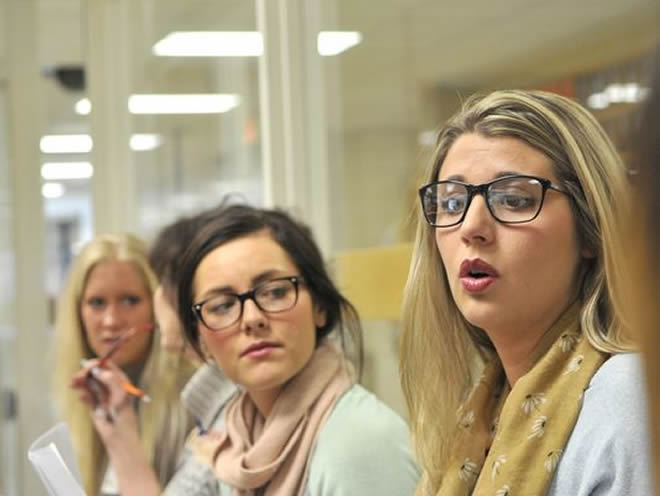

Monday, March 30, 2015
Many adults may remember the high emotion, reactionary behavior and seemingly devastating consequences of various slights and drama from their middle school years.
Principal Jason Harris lives in this world every day at South Junior High School.
"What we see at this age with students is they don't know how to communicate how they feel, so they act on impulse and it's usually physical," he said.
That leads to behavior problems and the consequences that come with them, like suspensions.
In an attempt to catch that behavior before it escalates, Harris is teaming up with the Conflict Resolution Center and a St. Cloud State University professor and students to start a pilot mediation program. The voluntary program will work with students to come up with mutually accepted resolutions and build or rebuild relationships.
Monday marks the third week of mediation sessions in the school.
Harris hopes the mediation helps students develop skills in problem-solving, communication and self-regulation.
"That's a lifelong skill that kids need," Harris said. "So the earlier we start to work on those skills and how to deal with your emotions and feelings, the better it's going to prepare them for the world."
Roseanna Ross, communications studies professor, mediator and coordinator of the St. Cloud State Employee Mediation Program, is helping organize the program. The details of the sessions are confidential, so Ross couldn't report many specifics about them.
"The young persons were very engaged," she said.
Mediators try to create an atmosphere where both parties can feel equally heard, tell their story and voice concerns.
"What often happens, in that process, they hear each other, and with facilitator support, see where they have common interests, and mutually come together to solve a problem," she said.
The process works the same whether the participants are 11 or 75 years old.
"You sort of had this feeling that only adults can have conversations ... but mediation is a process that empowers all in the process," she said.
Harris was contacted last summer with information about the CRC satellite office in St. Cloud and its desire to collaborate with the schools.
The district has some precedent for similar programs, including restorative justice efforts. Harris knows that creating a safe environment by dealing with bullying and harassment is key to students' success.
"If kids don't feel safe in school, they're not going to learn," Harris said.
The mediators, who are trained St. Cloud State students, will come in once a week through the end of the school year.
"Most kids do want to come to a resolution and to have a solution when they have a conflict," he said.
If it's a high level of harassment, bullying or fights, administrators wouldn't use this model. But low-level, minor harassment situations would be prime for mediation.
"I think it ultimately helps curb suspensions," Harris said. "Once kids develop skills with how to deal with conflict, how to deal with anger management, self-regulation, this (reduces) that end result of suspension."
Suspensions in St. Cloud school district increased by nearly 60 percent in the 2013-14 school year. St. Cloud issued more than 11 suspensions per 100 students, nearly twice the statewide rate.
Suspensions of black students in St. Cloud saw a particularly large increase, according to figures released by the Minnesota Department of Education.
"We're trying to get the root cause and trying to set up some clear expectations," Harris said.
The CRC has a very robust middle and high school mediation program in the Twin Cities.
"We definitely call our program a suspension prevention program," said CRC Executive Director Karmit Bulman. "We are asking all schools to consider doing conflict resolution work, as a teachable opportunity, as opposed to removing from classroom or school."
The Minneapolis Public Schools use mediation as an early intervention and for building of community within the schools, said Julie Young-Burns, safe and drug-free schools coordinator.
Bulman said where mediation is used, absenteeism goes down, behavioral infractions go down, grades go up, general demeanor improves and students are more likely to be successful.
"The outcomes have really been beyond our greatest expectations," Bulman said.
The CRC also has conflict resolution curriculum for middle and high school kids.
All the trained mediators have a component of training that deals with cultural sensitivity, said Kim Hansen, the CRC's St. Cloud program development consultant. Organizers haven't talked about specific cultural strategies yet.
South has about 1,000 students, with 40 percent students of color, including about 28 percent black students, Harris said.
Hansen said the CRC would like to integrate some of the Somali elders into the school program, as long as there aren't conflicts on interest, such as having a child in the school.
Jama Alimad, one of the organizers of the Somali elder training program in St. Cloud, emphasized the elders' desire to work with youth.
"What I'm trying to do with this program is how to integrate those kids together ... how we can build this trust," he said. "So to solve those kinds of problems we have to start from scratch, to build those kids in a really meaningful way."
He wants to see mentoring, counseling, mediation, negotiation and restorative justice for Somali kids and beyond.
In the subsequent school year, the CRC hopes to roll the program out across the district, Hansen said. Eventually, the district could pay a fee for the service. But there are no costs to the school associated with the pilot program.
Meanwhile, Harris brings the conversation back to the kids.
"The biggest thing for us ... it's another added resource and support for our students," Harris said, "helping them be productive citizens."